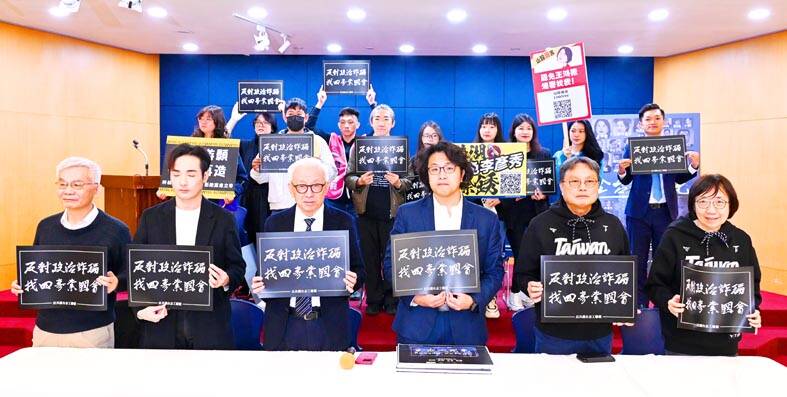Citizen groups yesterday announced nationwide events to promote recall campaigns against 32 Chinese Nationalist Party (KMT) legislators, while more than 70 civic organizations said they would provide resources and staff to assist the movement.
Recall campaigners announced the plan, as part of efforts to reach the second-stage threshold, which requires signatures from at least 10 percent of voters.
In the coming weeks, groups would hold gatherings and lectures in key areas to inform voters about the recalls, the state of the legislature and what they can do to resist the agenda of opposition party lawmakers, speakers at the event in Taipei said.

Photo: Liu Hsin-de, Taipei Times
Much of the attention at the event focused on the recall of KMT caucus whip Fu Kun-chi (傅?萁), who represents a district in Hualien County.
“We must oust Fu, only then can we ensure a better future for Hualien residents and safeguard Taiwan’s democracy,” said a man identified only as “W,” who heads up the Shimmer Hualien group, dedicated to removing Fu.
W said the “Fu Dynasty” began with his election in 2001, and since then, he and his wife, Hsu Chen-wei (徐榛蔚), have each served as legislator and commissioner to dominate Hualien politics for more than 20 years.
“Hualien residents have had enough of Fu,” W said.
“Fu is not the ‘King of Hualien,’ he is an elected servant, who should be working for the people. County residents must not be afraid of Fu’s intimidation and harassment tactics, or his deputies,” W said.
United Microelectronics Corp founder Robert Tsao (曹興誠), Democratic Progressive Party Legislator Puma Shen (沈伯洋), who is cofounder of the Kuma Academy, and other prominent figures also attended the event.
On Tuesday, more than 70 civil society groups together formed a network of non-governmental organizations to support people in the recall movement, following reports that recall campaigners had faced harassment and acts of intimidation, and had been denied use of public spaces by local officials.
The group said they would assist with personnel and resources to aid signature drives in the electorate districts of legislators targeted for recall.
Humanistic Education Foundation executive director Joanna Feng (馮喬蘭) said that the Ministry of Justice should establish a task force to monitor and crack down on efforts to interfere in recall drives.
“All recall drives are initiated by citizen groups, voters in their electorate district, but some KMT supporters are attempting to intimidate campaigners,” Feng said, adding that the personal information of some people leading recalls have been leaked.
“Lawyers have been assigned to help them, and if need be, represent them in legal matters concerning intimidation tactics and privacy contravention incidents,” she said.
Additional reporting by Chen Cheng-yu

Taiwanese were praised for their composure after a video filmed by Taiwanese tourists capturing the moment a magnitude 7.5 earthquake struck Japan’s Aomori Prefecture went viral on social media. The video shows a hotel room shaking violently amid Monday’s quake, with objects falling to the ground. Two Taiwanese began filming with their mobile phones, while two others held the sides of a TV to prevent it from falling. When the shaking stopped, the pair calmly took down the TV and laid it flat on a tatami mat, the video shows. The video also captured the group talking about the safety of their companions bathing

US climber Alex Honnold is to attempt to scale Taipei 101 without a rope and harness in a live Netflix special on Jan. 24, the streaming platform announced on Wednesday. Accounting for the time difference, the two-hour broadcast of Honnold’s climb, called Skyscraper Live, is to air on Jan. 23 in the US, Netflix said in a statement. Honnold, 40, was the first person ever to free solo climb the 900m El Capitan rock formation in Yosemite National Park — a feat that was recorded and later made into the 2018 documentary film Free Solo. Netflix previewed Skyscraper Live in October, after videos

Starting on Jan. 1, YouBike riders must have insurance to use the service, and a six-month trial of NT$5 coupons under certain conditions would be implemented to balance bike shortages, a joint statement from transportation departments across Taipei, New Taipei City and Taoyuan announced yesterday. The rental bike system operator said that coupons would be offered to riders to rent bikes from full stations, for riders who take out an electric-assisted bike from a full station, and for riders who return a bike to an empty station. All riders with YouBike accounts are automatically eligible for the program, and each membership account

A classified Pentagon-produced, multiyear assessment — the Overmatch brief — highlighted unreported Chinese capabilities to destroy US military assets and identified US supply chain choke points, painting a disturbing picture of waning US military might, a New York Times editorial published on Monday said. US Secretary of Defense Pete Hegseth’s comments in November last year that “we lose every time” in Pentagon-conducted war games pitting the US against China further highlighted the uncertainty about the US’ capability to intervene in the event of a Chinese invasion of Taiwan. “It shows the Pentagon’s overreliance on expensive, vulnerable weapons as adversaries field cheap, technologically